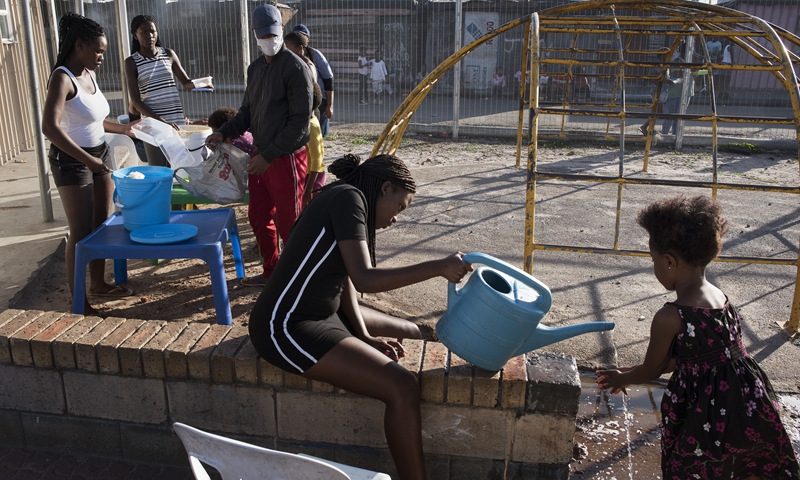Virus booze ban causes headache for S.African winemakers
Source:AFP Published: 2020/6/21 19:17:32

Children wash their hands at a crèche in Langa, near Cape Town on May 14, before receiving a meal, which is part of a project to feed people made vulnerable under the lockdown in South Africa, as a result of COVID-19. Photo: AFP
Wineries around Cape Town fear a nine-week alcohol sales ban will leave a bad hangover that outlasts the coronavirus pandemic, as South African bottles lose their spots on international shelves and thousands of jobs are lost.
Africa's most industrialized economy shuttered liquor stores at the start of a strict anti-coronavirus lockdown on March 27 to limit the spread of COVID-19, and reduce pressure on busy emergency wards.
The controversial booze ban was lifted on June 1 as part of a gradual easing of confinement measures to limit the economic setbacks of the pandemic. But wine producers in the valleys of South Africa's Western Cape Province are concerned that the industry will struggle to bounce back.
The alcohol sales ban was coupled with a six-week export freeze - raising concern that buyers could turn to suppliers in other countries if demand abroad was not rapidly met.
"We were the only country in the world where wine exports were not allowed," said Boyce Lloyd, CEO of South African top wine and spirits producer KWV.
Lloyd said buyers in key importing countries such as Canada, Finland and Sweden removed bottles that did not meet a minimum sales rate.
"When you do not have stock on the shelf obviously you can't record a sale and then you get delisted," he said.
"That is a very real risk we are facing."
At the Nabygelegen wine cellar in the southern town of Wellington, owner James Mckenzie said international buyers had grown nervous about "putting all their eggs in one basket."
"They are now looking at importing other countries' wines in case there is a problem again," Mckenzie told AFP. "Those are long-term decisions which may affect us over the next years."
The risk of being delisted has been exacerbated by delays at ports due to coronavirus outbreaks among staff. The Western Cape is the hot spot of South Africa's epidemic, with more than half of the 92,681 cases.
Cape Town harbor staffers have not been spared.
Newspaper headline: Booze ban troubles S.African winemakers
Posted in: AFRICA